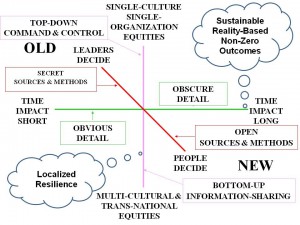
Complex, force is.
U.S. Repeals Propaganda Ban, Spreads Government-Made News To Americans
Posted By John Hudson Sunday, July 14, 2013 – 7:06 PM Share
For decades, a so-called anti-propaganda law prevented the U.S. government's mammoth broadcasting arm from delivering programming to American audiences. But on July 2, that came silently to an end with the implementation of a new reform passed in January. The result: an unleashing of thousands of hours per week of government-funded radio and TV programs for domestic U.S. consumption in a reform initially criticized as a green light for U.S. domestic propaganda efforts. So what just happened?
Until this month, a vast ocean of U.S. programming produced by the Broadcasting Board of Governors such as Voice of America, Radio Free Europe/Radio Liberty and the Middle East Broadcasting Networks could only be viewed or listened to at broadcast quality in foreign countries. The programming varies in tone and quality, but its breadth is vast: It's viewed in more than 100 countries in 61 languages. The topics covered include human rights abuses in Iran; self-immolation in Tibet; human trafficking across Asia; and on-the-ground reporting in Egypt and Iraq.
The restriction of these broadcasts was due to the Smith-Mundt Act, a long standing piece of legislation that has been amended numerous times over the years, perhaps most consequentially by Arkansas Senator J. William Fulbright. In the 70s, Fulbright was no friend of VOA and Radio Free Europe, and moved to restrict them from domestic distribution, saying they “should be given the opportunity to take their rightful place in the graveyard of Cold War relics.” Fulbright's amendment to Smith-Mundt was
bolstered in 1985 by Nebraska Senator Edward Zorinsky who argued that such “propaganda” should be kept out of America as to distinguish the U.S. “from the Soviet Union where domestic propaganda is a principal government activity.”
Zorinsky and Fulbright sold their amendments on sensible rhetoric: American taxpayers shouldn't be funding propaganda for American audiences. So did Congress just tear down the American public's last defense against domestic propaganda?
Read full article [free registration required]

ROBERT STEELE: This is neither as bad as it sounds, nor as good. BBG does good work, and whatever its ties — as with those of the BBC — to the secret world, on balance they are a positive force, and one of the last bastions of true cultural, historical, and linguistic competency in the US Government. They also have a Congressionally-mandated “arms length” distance from the political toads in the Department of State, and can — if their integrity is strong — be completely transparent and truthful. The whole idea of government-made, taxpayer-funded “news” being broadcast to the US public matters because down the road there will be an Open Source Agency, a sister agency to the BBG, that is responsible for public intelligence in the public interest, and its mission will be to provide all stakeholders with decision support across all threats and all policies, with the US public explicitly the primary beneficiary. Education in the USA stinks. The corporate media in the USA stinks. Research into legitimate matters of local to global concern stinks. Unfortunately, the integrity of the US Government also stinks. And therein lies the challenge.

The US public has gotten the government it deserves because it has refused to pay attention at the same time that the 1% has paid to get all the attention it wants. The 1% now own the executive, the legislature, and the Supreme Court, and they are replicating their success at the state level as fast as they can.
We are in a time of transition. Epoch B is about bottom-up open source everything and multi-everything, building consensus through collaboration. This is the opposite of top down unilateral “command and control” that is enforced at the point of a gun, where there is no intelligence with integrity, just a curt “because we say so.”
Hybrid self-governance is marching ahead. The smart money is routing around the US Government until such time as that government once again represents the public interest. Bottom up initiatives such as Crisis Mappers represent the alternative to dysfunctional government. I have absolute confidence in the eventual triumph of our digital natives.



